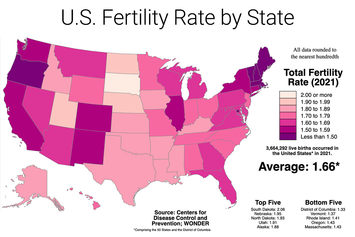
U.S. fertility rates have fallen to just 1.6 per woman. This has led some to fear that the United States may face the same kind of demographic collapse that is besetting Japan.
While some may cheer that this makes overpopulation less of a problem, low fertility rates translate to serious economic problems. As demographer Peter Zeihan notes, people in their 20s and 30s spend lots of money, people in their 40s through 60s save money that can then be used for investments in improved productivity, but older people large retire from the economy. The young consumers drive economic growth and the middle-aged savers fund that growth. If the ratio of younger people to older people falls too low, then the economy stops growing, which reduces economic mobility and security.
In addition to Japan, several other countries are going through this today, including China, Italy, and Brazil, among others. Historically, countries like Japan have compensated for low numbers of young people by exporting a high percentage of what they produce, effectively making the importing countries take the place of local young consumers. The United States has been the biggest consumer of stuff exported from other countries, but if U.S. demographics change, it won’t be able to do that much longer. That will cause more strife both locally and worldwide.
The United States has historically enjoyed a healthy demography despite low birthrates due to its welcoming large numbers of immigrants. But a growing anti-immigration movement is making that difficult, even if the anti-immigrationists have no solution to the demographic problems that will result.
Research shows that higher population densities mean lower fertility rates. High housing prices also lead to lower fertility rates. Further research shows that “living in spacious housing and in a family-friendly environment for a relatively long time leads to higher fertility.”
In short, if you think that preventing demographic collapse is a good thing, then this becomes one more reason to oppose planners who want to densify American cities. Planners’ efforts to force more people to live in apartments or smaller homes by making housing artificially expensive could be the downfall of the American economy.
This piece first appeared at The Antiplanner.
Randal O'Toole, the Antiplanner, is a policy analyst with nearly 50 years of experience reviewing transportation and land-use plans and the author of The Best-Laid Plans: How Government Planning Harms Your Quality of Life, Your Pocketbook, and Your Future.
Chart: U.S. Fertility Rate by state, via Wikimedia under CC 4.0 License.












